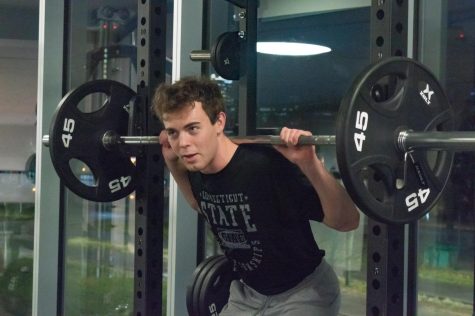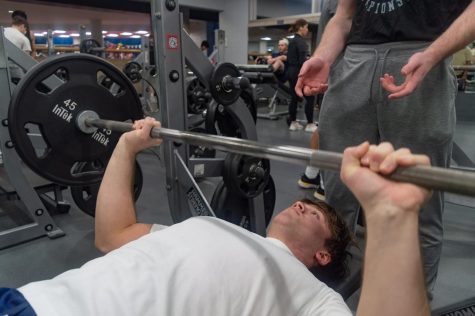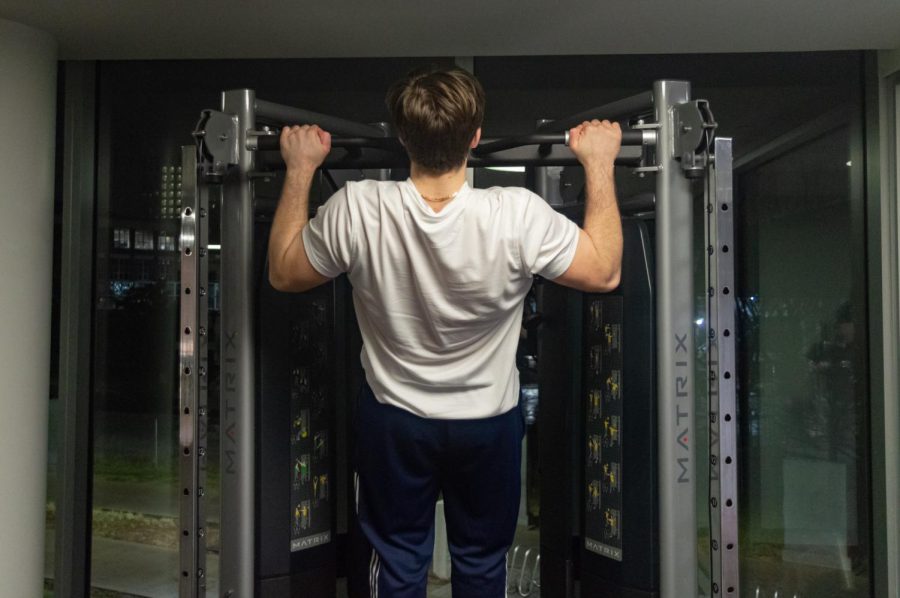Online ‘gym bro’ media encourages unhealthy workout habits, body image issues
Nick Gallina works out at the International Village gym. He did pull-ups on a Matrix machine.
February 11, 2023
As gym enthusiasts take to social media to share progress pictures and workout inspiration, they run the risk of promoting aesthetically-motivated workout habits that promote body image issues and unhealthy exercise practices.
Consuming content from people who have impressive physiques can motivate others to go to the gym. However, this kind of visual-first gym content sets unrealistic expectations for an aspirational body and may convince consumers that they too can reach their fitness goals if they eat a certain way, lift a certain amount or do specific exercises.
Sulay Tariq, a second-year computer science and business administration combined major, said seeing fitness content on social media plays a big part in motivating him to go to the gym. Tariq said he is often excited about trying a new workout he sees online, and he’ll feel inspired to head to the gym after watching a “hype” video.
“Aesthetics and strength, that’s the only reason I go [to the gym],” Tariq said.

David Kau, the head personal trainer at Marino Recreation Center, has seen students like Tariq pass through the on-campus gym.
“Whatever people’s goals are, there’s always going to be some extreme of that posted online,” Kau said. “Everyone is built differently for a reason. Your body is good at doing certain things and is bad at doing other things. Sometimes you just can’t change that.”
Kau said that he’s noticed a common misconception that you have to look a certain way in order to be considered fit. Whether someone aspires to become toned or to have bigger muscles, they can find online content that represents those fitness goals.
Rachel Rodgers, an applied psychology professor at Northeastern, has conducted research that shows that individuals who are exposed to social media content that promotes appearance-based ideals can lead to a perception that people who look a certain way are more attractive and more valuable.
“People who are exposed to that type of content do tend to show more body image concerns and tend to report engaging in more disordered behaviors,” Rodgers said. “That includes excessive exercise as well as disordered eating.”
The authenticity of this kind of gym content is also of concern for researchers like Rodgers. A survey by Truepic, a photo and video verification platform, found that 64% of the U.S. adults polled had edited photos of themselves before posting them to social media.
“Most people do not look like what they look like in the media,” Rodgers said. “These pictures are accompanied by messaging that reinforces this idea that the appearances that you’re seeing are really valuable. If you don’t have that type of a body, then you don’t have the same social capital.”

Gym-goers don’t always engage in this toxic cycle of comparison and disordered body image. For example, embodied exercise or joyful movement is when individuals engage in body movement that boost endorphins and relieves stress, according to the Mayo Clinic. There are also real ways that consistent exercise can improve physical and mental health, according to the CDC.
“There are so many benefits of exercise that are beyond looking good, whether it’s improving your cardiovascular health or your bone health,” Kau said. “Having muscle mass on your body is an important thing and building some functional strength for the sake of staying healthy is, I think, highly underrated in the fitness community.”
Regardless, Rodgers said there is no way of knowing exactly what long-term effects the consumption of media will have on younger generations.
“In the short term, we know that it erodes body image and that it increases negative feelings about yourself and the things that you’re doing,” she said. “That all accumulates [over time].”


















